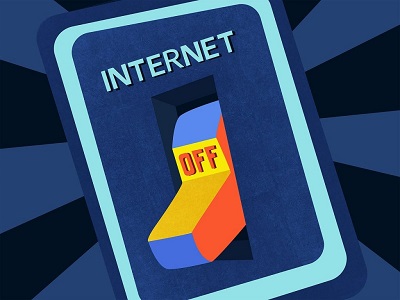Is it possible to crash or shut down the entire Internet?No. The Internet is made up of a number of different networks that are administered and maintained by a number of different individuals, corporations, and governments. Therefore, mistakenly or inadvertently introducing the entire internet is quite tough. Internet traffic is reliable, with the capacity to reroute traffic in advance of any problems. There is no large on/off switch. It is impossible to disconnect from the internet in a proper manner. It is a varied platform with numerous different interconnected networks. It was made with the purpose of becoming unnecessary. Even if one piece of the network goes down, users should be able to access all or part of the other accessible networks. As a result, shutting down the Internet is not an option. 
With a bulldozer and/or submarines, an attacker may interrupt a huge quantity of internet traffic with the help of severing some of the primary fiber-optic cables that act as the internet's core. To properly shut down the network, all wired and wireless networks throughout the world must be disrupted. A massive, catastrophic event, such as a meteor destroying much of the globe, would be required. Additionally, whether or whether the internet is entirely inaccessible will be the least of our concerns if this occurs. However, you may block a specific website or online media platform. If done from the user's perspective, it will necessitate a high level of coding and hacking skills. Furthermore, site owners have the option of shutting down their sites. The causes for a shutdown might be anything from a lack of traffic to a heavy internet load. Internet outagesThe Internet is nevertheless susceptible to disruptions, which are frequently triggered by extreme events such as massive power outages and earthquakes. When a major outage happens, it may affect a big portion of the Internet or perhaps an entire country. Even the most severe interruptions, on the other hand, will not result in the Internet going down or collapsing. For example, a series of earthquakes hit Asia in early 2007, a series of earthquakes struck Asia, damaging undersea cables and creating severe Internet and phone disruptions across the continent. The rest of the globe, on the other hand, continued to have Internet access. Internet blocked by countriesFirewalls and other security measures can be used by certain nations to prevent people from accessing Internet pages or to completely ban access to the Internet. For example, during protests in Egypt in 2011, the Egyptian authorities repeatedly shut down the Internet to prevent any information from seeping onto the Internet. However, citizens were able to use the Internet in some way, even during this strict shutdown. Network configuration problemsDespite the fact that protections are in place to help secure network equipment that helps run the Internet, those in charge of such equipment can still make mistakes. If equipment is set up or upgraded incorrectly, parts of the Internet might fall down. In 2019, Verizon, for example, created a BGP (Border Gateway Protocol) route leak, which affected a variety of services, including AWS and Cloudflare. Hundreds of services and websites and went down for almost two hours because so many websites and services depend upon these companies. Many sites and services that were not dependent on these services, on the other hand, continued to function normally. Network attacksDDoS attacks, for example, can cause a lot of trouble for a service or website. The goal of these attacks is to flood a corporation with so many requests that it becomes unable to function. These attacks can bring one or a few websites offline for a short period of time. The attacks, however, are limited to a particular website or service on the Internet rather than the whole Internet.
Next TopicWhat is a plotter
|
 For Videos Join Our Youtube Channel: Join Now
For Videos Join Our Youtube Channel: Join Now
Feedback
- Send your Feedback to [email protected]
Help Others, Please Share










